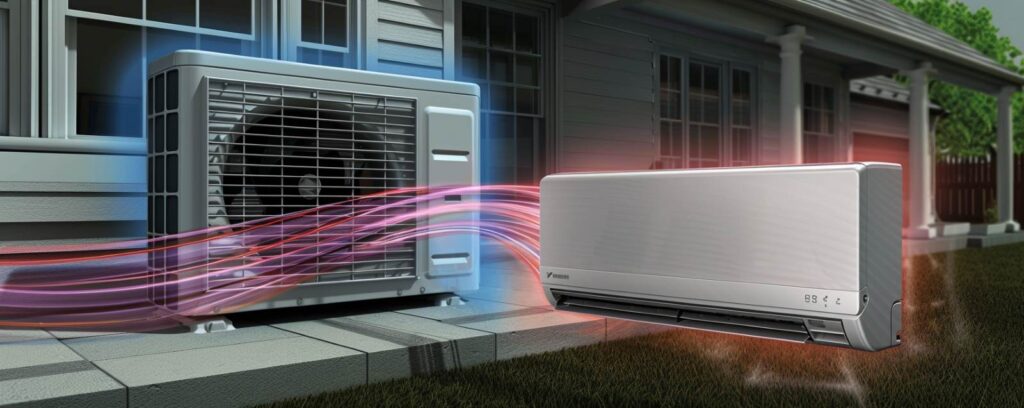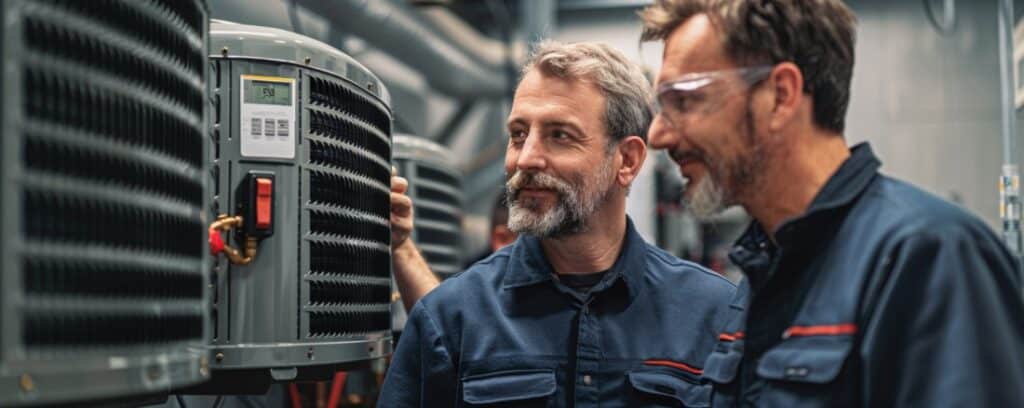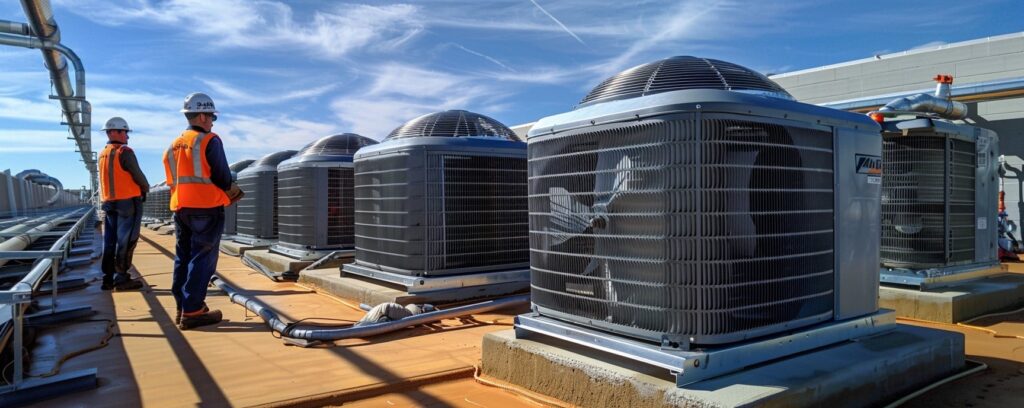The Heating, Ventilation, and Air Conditioning (HVAC) industry has always been a cornerstone of modern comfort. Over the decades, it has witnessed numerous technological advancements aimed at enhancing efficiency, reducing energy consumption, and maximizing user comfort.
Today, as we stand on the threshold of an era marked by rapid technological growth, the future of HVAC is poised to be more innovative than ever before. In this article, we delve into the groundbreaking innovations that are redefining the HVAC landscape and what they signify for both consumers and professionals.
- The 12 Pioneering Innovations
- 1. Smart Thermostats
- 2. HVAC Zoning Systems
- 3. Eco-friendly Refrigerants
- 4. Variable Refrigerant Flow (VRF) Systems
- 5. AI-Powered Predictive Maintenance
- 6. Solar-Integrated HVAC Systems
- 7. Geothermal Heating and Cooling
- 8. HVAC with Air Purification Technologies
- 9. Wearable HVAC
- 10. Augmented Reality (AR) for HVAC Maintenance
- 11. Building Integration and Smart Building Systems
- 12. Modular HVAC
- Shaping Tomorrow’s HVAC Roles
- Continuous Learning is Key
- Evolving Business Models
- Curriculum Evolution in Training Programs
- Specialized Certifications Emerge
- The Role of Apprenticeships in the Modern Age
- Emerging Roles in HVAC R&D (Research & Development)
- Sustainable and Green HVAC Technologies
- Consultancy Roles for Advanced HVAC Solutions
- Championing Environmental Sustainability
- Prioritizing Health and Comfort
- Aligning with Global Sustainability Goals
- 1. What are the key innovations shaping the future of HVAC?
- 2. How will these innovations impact HVAC professionals?
- 3. What changes are expected in HVAC training and certification?
- 4. How are innovations in HVAC promoting sustainability?
- 5. How do modern HVAC systems impact health and comfort?
- 6. What are the career opportunities arising from HVAC innovations?
- 7. How do wearable HVAC systems work?
- 8. Are there specialized certifications for green HVAC practices?
The 12 Pioneering Innovations
As the industry evolves, here are the top 12 innovations that are influencing the future of HVAC:
1. Smart Thermostats
Modern thermostats have come a long way from the traditional dial-type units. Today’s smart thermostats are equipped with advanced sensors, AI algorithms, and internet connectivity. They can learn from user preferences, adjust heating or cooling patterns to optimize energy consumption, and even be controlled remotely using smartphones.
2. HVAC Zoning Systems
One size doesn’t fit all, especially when it comes to heating and cooling needs. HVAC zoning systems allow homeowners to set different temperature zones within the same building. This means the living room can be kept warmer during a winter evening gathering while the unused bedrooms remain cooler, ensuring energy is used efficiently.
3. Eco-friendly Refrigerants
The environmental impact of refrigerants has been a significant concern. The industry is now moving towards eco-friendly refrigerants that are not only more efficient but also have a reduced environmental footprint, especially concerning ozone layer depletion.
4. Variable Refrigerant Flow (VRF) Systems
VRF systems are becoming increasingly popular, especially in commercial settings. These systems can heat and cool different areas of a building simultaneously, offering unparalleled flexibility and efficiency.
5. AI-Powered Predictive Maintenance
Maintenance in the HVAC world is undergoing a revolutionary change, thanks to artificial intelligence. AI-powered predictive maintenance tools can analyze vast amounts of data to predict when a particular component might fail, enabling timely interventions and reducing system downtimes.
6. Solar-Integrated HVAC Systems
Merging renewable energy with HVAC, solar-integrated systems utilize solar power either as a primary or supplementary power source. This not only reduces the electricity bills but also shrinks the carbon footprint of the building.
7. Geothermal Heating and Cooling
Tapping into the Earth’s consistent underground temperature, geothermal systems offer a sustainable solution for heating and cooling needs. They’re energy-efficient, eco-friendly, and provide consistent comfort throughout the year.
8. HVAC with Air Purification Technologies
With increasing concerns about indoor air quality, HVAC systems are now being integrated with advanced air purification technologies. These systems not only regulate temperature but also ensure that the air inside the building is free of pollutants and allergens.
9. Wearable HVAC
Imagine carrying your comfort with you wherever you go. Wearable HVAC devices, though still in nascent stages, promise individualized climate control. Whether it’s a cooling scarf or a heated jacket, the future might see us wearing our HVAC systems.
10. Augmented Reality (AR) for HVAC Maintenance
For technicians, diagnosing complex HVAC issues can be challenging. Augmented Reality is emerging as a powerful tool to visualize and troubleshoot problems, overlaying digital information on the real world, and offering real-time guidance.
11. Building Integration and Smart Building Systems
HVAC systems of the future won’t work in isolation. They’ll be integrated parts of comprehensive smart building systems, communicating with lights, security systems, and more, offering an interconnected web of smart solutions.
12. Modular HVAC
Changing needs require adaptable solutions. Modular HVAC systems are designed with scalability in mind, allowing for easy modifications and upgrades, ensuring they remain relevant for longer periods.
These innovations are not just transforming the way HVAC systems function, but they’re also reshaping our expectations of what’s possible. As the boundaries of technology and innovation expand, the future of HVAC promises unprecedented comfort, efficiency, and sustainability.
Implications for HVAC Professionals
The rapid influx of innovation in the HVAC industry has profound implications for professionals, both present and aspiring. With changing technologies come evolving roles, responsibilities, and opportunities.
Shaping Tomorrow’s HVAC Roles
The introduction of AI, AR, and other advanced technologies means that tomorrow’s HVAC technicians will require a blend of traditional mechanical skills and a newfound tech-savviness.
-
Tech Integration: Professionals will find themselves working closely with IT teams, especially in larger setups where HVAC systems communicate with other smart systems in a building.
-
Specialized Technicians: As the industry grows in complexity, there will be a surge in demand for specialists – technicians proficient in geothermal solutions, smart integrations, or solar HVAC setups, to name a few.
Continuous Learning is Key
Innovation invariably demands continuous learning.
-
Updated Training Programs: Traditional training programs will evolve, incorporating modules on the latest technologies. For instance, courses might include segments on smart thermostat installation or AI-driven maintenance.
-
Certification Renewals: With the rapid pace of technological advancements, certifications will have shorter validity, necessitating frequent renewals.
Evolving Business Models
For those who run or are planning to start HVAC businesses, staying updated is not just about technology; it’s about business models too.
-
Service Agreements: With predictive maintenance becoming mainstream, businesses can offer subscription-based service agreements, ensuring consistent revenue streams.
-
Consultancy Services: As homes and offices become smarter, there’s an opportunity for HVAC professionals to branch out into consultancy, helping clients design integrated HVAC solutions tailored to their needs.
The Changing Landscape of HVAC Training and Certification
The innovations shaping the future of HVAC aren’t just influencing the tools and technologies used in the industry; they’re also redefining the educational landscape.
Curriculum Evolution in Training Programs
HVAC training institutions are fast adapting to the technological shifts, integrating contemporary topics into their curricula.
-
Hands-on Tech Training: Modern training programs now emphasize hands-on experience with the latest tools – be it smart thermostats, AR diagnostic tools, or AI-driven maintenance software.
-
Holistic Education: Given the interconnected nature of modern HVAC systems, students are also introduced to peripheral domains, like basic IT, renewable energy sources, and smart building designs.
Specialized Certifications Emerge
As the industry branches into specialized niches, so do the certification programs.
-
Green HVAC Certification: With sustainability at the forefront, certifications focusing on green HVAC practices are gaining traction.
-
Smart HVAC Systems Certification: Tailored for those keen on mastering the intricacies of smart and integrated HVAC solutions, these certifications are becoming increasingly valuable in the market.
The Role of Apprenticeships in the Modern Age
While the importance of traditional apprenticeships remains undiminished, they too are evolving.
-
Diverse Learning Experiences: Modern apprenticeships offer budding technicians exposure to a broader array of technologies and systems, ensuring they’re well-equipped for the future.
-
Networking Opportunities: Apprenticeships are also a pathway to building valuable industry connections, essential in an era where collaboration is key to innovation.
The convergence of traditional HVAC practices with cutting-edge technologies presents an exciting phase for the industry. The need of the hour for professionals is adaptability – the willingness to learn, unlearn, and relearn in tandem with the industry’s pulse.
Career Opportunities Born from Innovation
Innovation in the HVAC world isn’t just introducing advanced systems and better technologies; it’s also ushering in a range of diverse career paths and opportunities. With a broader spectrum of services and specializations, HVAC professionals have a multitude of avenues to explore.
Emerging Roles in HVAC R&D (Research & Development)
Research and development in HVAC is booming, leading to a surge in roles centered around designing the next big innovation.
-
Product Design Engineers: With an emphasis on energy efficiency and user-centric design, professionals specializing in developing new HVAC products are in demand.
-
Sustainability Researchers: Dedicated to finding greener solutions, these professionals work on enhancing the environmental friendliness of HVAC systems.
Sustainable and Green HVAC Technologies
The green revolution has permeated the HVAC industry, leading to roles that prioritize sustainability.
-
Green System Installers: Professionals who specialize in installing and maintaining eco-friendly HVAC systems, such as solar-integrated or geothermal setups.
-
Sustainability Consultants: Experts who advise businesses and homeowners on the best sustainable HVAC solutions tailored to their needs.
Consultancy Roles for Advanced HVAC Solutions
With the growing complexity of HVAC systems, especially in large commercial settings, there’s a growing need for consultancy services.
-
Smart Building HVAC Consultants: These consultants help design comprehensive HVAC solutions for smart buildings, ensuring seamless integration with other systems.
-
Specialized System Advisors: Professionals who offer advice on niche HVAC systems, from wearable HVAC to advanced zoning solutions.
The Broader Impact of HVAC Innovations
Innovation in HVAC extends beyond advanced systems and enhanced user comfort. The ripple effects of these advancements are felt on a much broader scale, influencing environmental metrics, health standards, and global sustainability goals.
Championing Environmental Sustainability
The modern HVAC industry plays a pivotal role in championing sustainability.
-
Reduced Carbon Footprint: With more energy-efficient systems and the integration of renewable energy sources, the HVAC industry is directly contributing to reduced carbon emissions.
-
Eco-friendly Refrigerants: The shift towards environmentally friendly refrigerants underscores the industry’s commitment to protecting the ozone layer and reducing global warming potential.
Prioritizing Health and Comfort
Advanced HVAC systems have a direct impact on indoor air quality, which in turn influences health.
-
Advanced Air Purification: With integrated air purification technologies, HVAC systems now actively reduce pollutants, allergens, and pathogens, ensuring healthier indoor environments.
-
Optimized Humidity Control: Modern systems offer better humidity control, which not only enhances comfort but also reduces the proliferation of mold and mildew.
Aligning with Global Sustainability Goals
The HVAC industry’s innovations resonate with broader global objectives.
-
Supporting Urbanization: As urban areas grow, efficient HVAC systems are crucial in ensuring comfortable living and working spaces.
-
Resource Optimization: Advanced HVAC systems are designed to optimize energy consumption, resonating with global goals of resource conservation and sustainability.
The innovations in the HVAC realm are a testament to the industry’s commitment to a better, more sustainable, and healthier future. These advancements, while technical at their core, have far-reaching implications, emphasizing the essential role of HVAC in shaping a better tomorrow.
The Pioneering Path Forward in HVAC
The metamorphosis witnessed in the HVAC industry is a testament to human ingenuity and our commitment to progress. As we stand at the intersection of tradition and innovation, it’s evident that the future of HVAC is not just about temperature control; it’s about holistic environmental and human well-being. The advancements, both current and forthcoming, represent more than just technological feats; they signify the industry’s dedication to creating spaces where people can thrive.
For aspiring HVAC professionals and those already in the field, this era offers unparalleled opportunities to be part of groundbreaking change. With every innovation comes the promise of better living standards, more efficient resource utilization, and a proactive approach to global sustainability challenges.
Embracing these changes, staying informed, and actively participating in this transformative journey will ensure that the HVAC industry continues to be a beacon of innovation and progress. As we move forward, one thing is certain: in the world of HVAC, the best is yet to come.
Frequently Asked Questions (FAQs) on HVAC Innovations
1. What are the key innovations shaping the future of HVAC?
Some of the pioneering innovations include smart thermostats, HVAC zoning systems, eco-friendly refrigerants, AI-powered predictive maintenance, and solar-integrated HVAC systems, among others.
2. How will these innovations impact HVAC professionals?
With the integration of advanced technologies, HVAC professionals will need to embrace continuous learning, gain tech-savviness, and adapt to evolving business models. There will be a surge in demand for specialists and roles in research & development, green HVAC technologies, and consultancy.
3. What changes are expected in HVAC training and certification?
Training programs will incorporate modules on the latest technologies, emphasizing hands-on tech training and holistic education. New specialized certifications will emerge, focusing on green practices and smart HVAC systems.
4. How are innovations in HVAC promoting sustainability?
The industry is moving towards more energy-efficient systems, integration of renewable energy sources, and environmentally friendly refrigerants. These changes directly contribute to reduced carbon emissions and align with global sustainability goals.
5. How do modern HVAC systems impact health and comfort?
Advanced HVAC systems offer integrated air purification technologies to reduce indoor pollutants and allergens. They also provide optimized humidity control, ensuring a healthier indoor environment and enhanced user comfort.
6. What are the career opportunities arising from HVAC innovations?
Beyond traditional roles, professionals can explore opportunities in HVAC research & development, sustainability research, green system installations, and specialized HVAC consultancy, among others.
7. How do wearable HVAC systems work?
While still in their nascent stages, wearable HVAC devices aim to provide individualized climate control. Examples could include cooling scarves or heated jackets, offering personalized comfort based on user needs.
8. Are there specialized certifications for green HVAC practices?
Yes, with the emphasis on sustainability, certifications focusing on green HVAC practices are gaining traction. These certifications ensure that technicians are trained in eco-friendly installations and maintenance.




